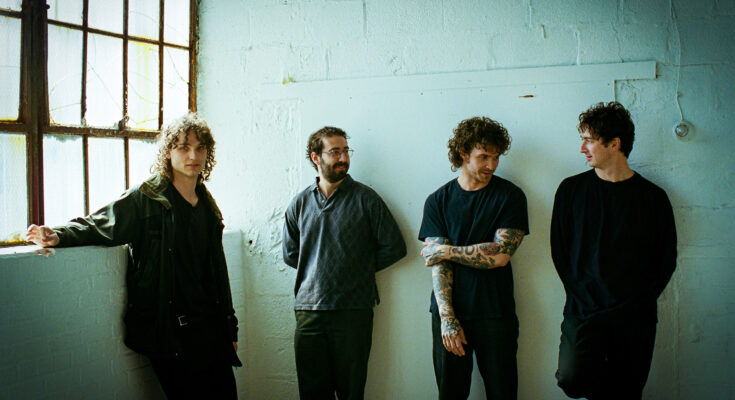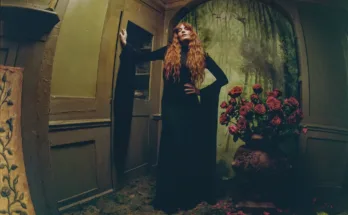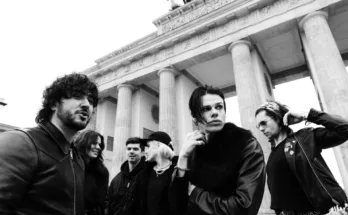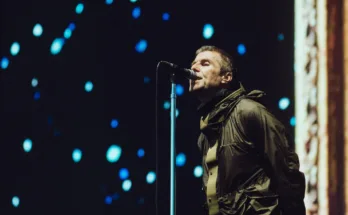
YHWH Nailgun’s name makes for a concise description, capturing the duality that makes their work so utterly captivating. ‘YHWH’ (pronounced Yahweh) is a name for God in the Hebrew Bible. It evokes the transcendent quality of the songs on their debut album ‘45 Pounds’; the way crescendos of ecstatic noise can rush straight through the listener’s core. ‘Nailgun’ captures its remorselessness: the rapid-fire punishment of Sam Pickard’s machine gun percussion, Jack Tobias’ disruptive electronics, Saguiv Rosenstock’s angle grinder guitar, the erratic howls and growls of frontman Zack Borzone. Their work thrives on the push and pull between these two extremes, placing their listener at the eye of a sonic storm.

And yet, the group themselves are reluctant to reduce their music to such a straightforward reading. “The name is not random, but it’s not constructive to look very carefully for hidden symbolism,” warns Pickard. All Borzone will offer is that the moniker arrived “almost as a premonition” during the earliest days of the band, a lockdown project between him and Pickard as roommates in Philadelphia – later fleshed out with the addition of Tobias after a move to Brooklyn’s Ridgewood neighbourhood, before Rosenstock, initially their producer, joined full time. “You put some words together, and then it opens something up in your brain that feels like the music you want to make,” Borzone continues.
They’re an opaque bunch when it comes to the fine details. Songs emerge “like conversations”, Borzone says, between the four of them in their cramped studio. They spend as much time chatting there as they do creating. To call them insular or wrapped up in their own process, however, would be to miss the point entirely. YHWH Nailgun’s music goes beyond the basic narrative of ‘band-writes-song-about-subject’ and instead aims towards something extradimensional.

Meanings can emerge after a piece is written, not before, Borzone says. “Sometimes you can find you’re trying to say something without knowing what it is that you’re trying to say. It’s not a controlled thing.” Adds Pickard: “It’s like a chicken and egg. You assign certain words or symbols or whatever to the music, but you don’t know which one’s informing the other one.”
They do have ‘rules’ of sorts, most prominently a focus on concision, quickness and intensity. Few of the tracks on their debut album ‘45 Pounds’ last much longer than two minutes, only one drifts beyond three. “My hope is that every song feels like getting punched in the stomach,” says Pickard. Keeping things brief, he says, helps to “maximise the impact”. Again, however, this aspect of the band is not one that emerged out of any great analysis. “It feels like the form was always that way, or something like that,” says Borzone.
“My hope is that every song feels like getting punched in the stomach” – Sam Pickard
To see the band onstage – particularly in footage from shows in the cramped and dingy confines of Bushwick’s train tunnels that have already passed into legend – is to see them tapping directly into that mysterious realm. Borzone, in particular, looks as if he’s possessed by something higher than himself when performing live. His eyes glaze over, his limbs become floppy but his movements deliberate as he prowls and twists around the stage. He calls it “feeling in raw form, an emotion that can then go in six different ways”. Earlier in his career, he admits to overthinking his role as a frontman, becoming obsessed with authenticity to the point it became stunting. But over time, he’s learnt to channel more primal instincts, letting them rush to the surface where he expresses them in exaggerated gestural movements.
The energy that YHWH Nailgun pour into the project goes further than just music. As well as electronics, for instance, Tobias provides all the group’s artwork with an aim to make the visuals as cohesive with their sound as possible. Just as the music eschews earthly concerns like genre trappings or obvious sonic references, his covers are slippery and abstracted. “It’s not like a Nine Inch Nails or a Swans thing, where it’s a solid logo identity and their sounds are specific. It’s everything expanding from blurriness, colour, light and dark,” he says.

Even Pickard, a tattoo artist when he’s not behind the drumkit, views that job as tapping into that same energy at the source of YHWH Nailgun. “I have the same impulse to do art, with two avenues for it. Sitting down and drawing on a person’s skin is actually a really similar feeling to making music. Both are about turning my brain off and rolling with whatever the creative impulses are that seem good.”
Borzone’s lyrics – though often hard to make out through his vocal contortions – appear to emerge as a flow of subconscious energy. A poet outside of the band, he says that “when Sam and I are talking, I feel similarities between what he’s doing in tattooing and what I’ve found in poetry”. Having previously cited transcendental writers like Walt Whitman and Paul Celan among his inspirations, poets who sought to deliver language in its most lucid form, Borzone’s words are as expressive as they are cryptic, fragmented and stuttering on ‘45 Pounds’ – but their emotional essence is always distilled.

“Weakness / Disappear / I feel / Raw / Castrato / Skinless / And I’m sparkling” he spits frantically over the spartan drums and jabbing electronics of ‘Castrato (Fullback)’. “Vultures lift me by my hair / I watch their wings like a baby while we fly / I’m in a white coat; I’m a Russian plane,” he stutters on ‘Tearpusher’, where twists and distortions attempt to push a relentless rhythm off course, over and over again until both are swallowed by a rush of noise that is the record’s most transcendent moment of all.
Motifs pop up multiple times across different songs – images of flight, wings and ascension, for instance, pepper almost every track on ‘45 Pounds’. So too is there a significant counterforce of self-flagellation and fear. Royalty is also common. Perhaps reflecting the Yahweh of the band’s name, it’s hard not to draw a link to something spiritual. “I’ve always liked religious iconography,” Borzone says, “for obvious reasons. It’s one of those easy-to-analyse, unconscious things.” He tells us he’s religious himself, although he’s cagey when it comes to the details. “I was pretty devoutly a certain specific tone of Christianity when I was young,” he offers after a long pause, “although that’s morphed over the years. Poetry is a really good practice for me, religiously. It’s not to try and elevate it by saying it’s a religious thing or something, but that’s kind of the role it performs.” Songwriting, he says, “fills the same role that my doctrine did.”
“The whole point is to get past the lazy” – Zack Borzone
YHWH Nailgun are surprised that the religious imagery in their work is not picked up on more. Perhaps, ponders Pickard, onlookers assume that faith would be far from the concerns of four young, fashionable underground noise musicians. “I think there’s a thing where people look at us and are like, ‘Oh, that must be simply out of the question,’” he says. When they are spoken about in relation to their home city, they say it’s often in a way that feels unsatisfactory. Though each of them enjoys much of the music to have come out of the city’s legendary No Wave scene of the late 1970s, they bristle at the oft-repeated idea they might be taking up some kind of mantle, simply because of some aesthetic coincidences.
“I love Suicide, and I would love to be able to claim that lineage, but you walk around Ridgewood, it doesn’t really feel like ‘New York grit!’” jokes Borzone. “It feels like low-hanging fruit to me,” adds Pickard. “It’s like, ‘OK, where are you from? What does your music evoke vaguely, and what do you look like?’ And then it’s like ‘Oh, the closest match is fucking DNA or something.’ It’s AI logic.”

If New York does have an impact on their work, they say, it can be detected in two ways. The first is a simple one – the claustrophobia of their working conditions that’s mirrored in their urgent sound. “We have a studio but it’s ridiculously small, it sucks, so maybe that dictates it,” says Tobias. The second is grander. “As much as people want to say it’s just hollowed out now for yuppies or whatever – and on one level that’s true – there is still this vitality to New York, no matter what,” says Pickard. “It doesn’t even really matter if it becomes this tech hell, or whatever, its crazy neurotic energy is still inspiring to me. As frustrating as space constraints are – and I’m not going to live here for the rest of my life – I’m really glad that the infancy of the band was here.”
“It’s a cooler city than I am a person,” says Borzone. “Just being here pumps you with something. You get shot up with some type of energy. You want to be the best in the world or something.”
Again, though, to put that remarkable energy at the centre of YHWH Nailgun down simply to their home city feels unsatisfactory. It’s lazy, the same way that comparing the band to No Wave artists who resided there half a century before them is lazy. And, as Borzone puts it, “the whole point is to get past the lazy”.
YHWH Nailgun’s ‘45 Pounds’ is out now via AD 93.
Listen to YHWH Nailgun’s exclusive playlist to accompany The Cover below on Spotify or on Apple Music here.
Words: Patrick Clarke
Photography: Marisa Bazan
Label: AD 93
The post YHWH Nailgun: relentless New York noisemakers in search of something higher appeared first on NME.



